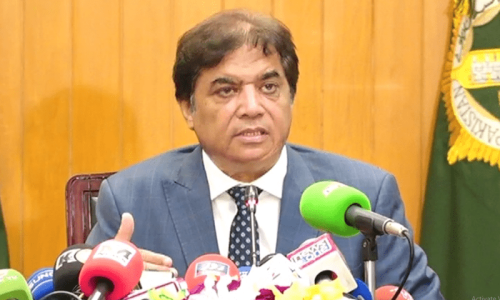ISLAMABAD: A much delayed Rs3 billion strategic project to secure the Balochistan capital from terrorism and smuggling appears to have become a turf war between two Chinese contractors and their influential supporters.
Sources said the former chief minister Sanaullah Zehri had approved the award of the contract to the ‘lowest evaluated bidder’ — Huawei consortium — on the expert advice of the procurement regulatory authority.
The provincial bureaucracy sat on the approval for around two weeks and is reported to have persuaded new Chief Minister, Abdul Quddus Bizenjo, to overturn the decision and has issued a letter of intent (LoI) to the ‘bidder with lowest price’ — ZTE consortium.
Both the chief ministers took their respective decisions on the same summary. “The ongoing saga of the award of contract for the execution of Quetta Safe City Project is setting a new standard in terms of influence peddling and stretching of procurement rules,” according to an official who has been part of the selection process spread over 18 months.
New chief minister overturns contract approved by his predecessor
The project envisaged about 1,400 security cameras, three scanners on main city entrances, 300km fibre optic cable, 260 poles and integrated security control rooms with hardware and screens.
The two parties, vested interests, bureaucracy and political leadership have been fighting over the project since 2016, causing an inordinate delay and a series of security incidents in Quetta over the last year.
The terms of reference (ToR) for Quetta Safe City were issued in September 2016 to selected public sector entities and their international technical partners as required under the Balochistan Public Procurement Regulatory Authority (BPRA) Rules. The parties included ZTE with SCO, National Electronic Complex (Necop), National Telecommunication Company (NTC), Huawei with National Radio Transmission Company (NRTC) and HKH and Army Welfare Trust (AWT).
Necop and NTC decided not to participate. The remaining bids were submitted on Sept 30, 2016. The Balochistan government appointed Nespak as the principal consultant that utilised the specialised services of a UK-based consulting firm — Red Tag. After four months of evaluation, AWT’s bid was disqualified on technical grounds.
Based on technical qualification, the financial bids of Huawei and ZTE consortiums were opened and the scores were collated and finalised on the basis of ‘Quality and Cost-Based Selection Method” as required under terms of reference of the BPRA rules. This required quality as the prime consideration and cost as secondary consideration and the firm with the highest combined / evaluated weighted score has to be declared winner.
The TOR laid out the scoring and evaluation criteria in accordance with Rule 34 (evaluation criteria) of the BPRA Rules, accorded 80 per cent weightage to technical and 20pc to the financial bid. On the basis of combined scores of 86.48, Huawei-NRTC consortium scored the highest marks while the ZTE-SCO achieved the second position by scoring 76.80.
As the lobbying intensified, the results were not announced as ZTE group supported the lowest financial bid while Huawei group claimed combined best scores on the basis of the bidding criteria.
Instead of adhering to the procurement rules that prohibit further negotiations and seek declaration of the winner on the basis of the competitive bidding process, the Balochistan government directed the two consortiums to submit revised financial bids. Yet again, based on the revised bids, the Huawei consortium achieved the highest evaluated score.
Because of intense debate, the provincial government approached BPRA for certain clarifications. The BPRA clarified that since the basis of the bidding was clearly laid out to be quality, the party scoring the highest aggregate marks (technical and financial) was the winner. It also said the selection criteria couldn’t be changed after submission of the bids and during the evaluation process.
Accordingly, the winner is the party achieving the highest score in compliance with the laid out scoring criteria and not necessarily the party with the lowest bid price, the BPRA noted on quoting the evaluation criteria and other terms and conditions set forth in the bidding document.
Notwithstanding unambiguous clarification by the BPRA, the Balochistan chief secretary proposed two options to the former chief minister. One, the project should be awarded to Huawei-NRTC on the basis of overall high score of 84.01 but with higher bid price of Rs2.96bn. Second, the project be given to ZTE-SCO with a low price of Rs2.28bn, but a lower evaluated score.
In view of legal clarifications by the BPRA, the former chief minister approved the Huawei-NRTC for contract award on November 3 last year, although it was financially expensive but technically stronger.
The bureaucracy did not issue the LoI for two months to the approved bidder.
As soon as the chief minister was forced to step down due to the evolving political situation, the provincial bureaucracy found a window to overturn his LoI approval to ZTE-SCO on Jan 26.
Published in Dawn, February 5th, 2018















































